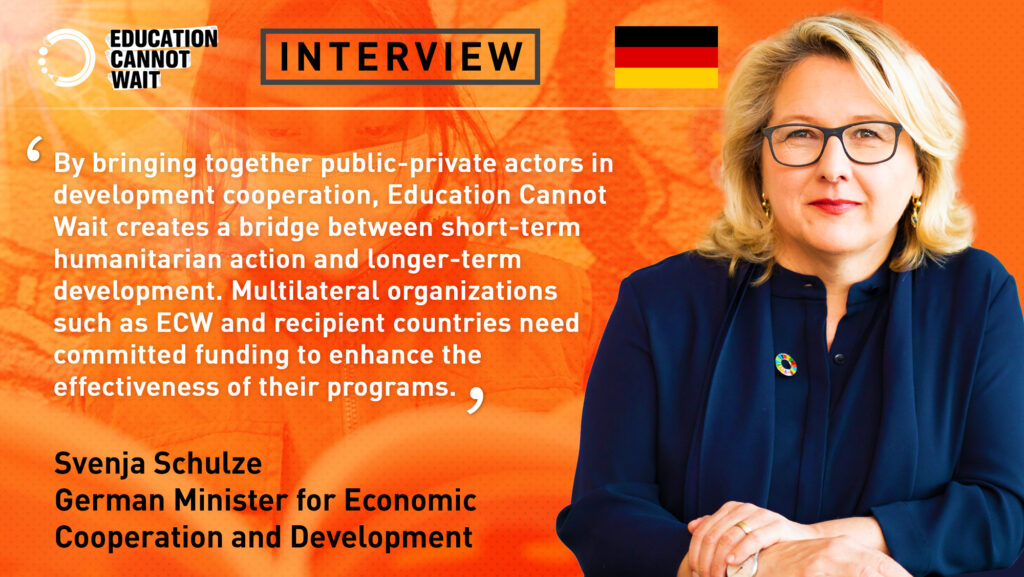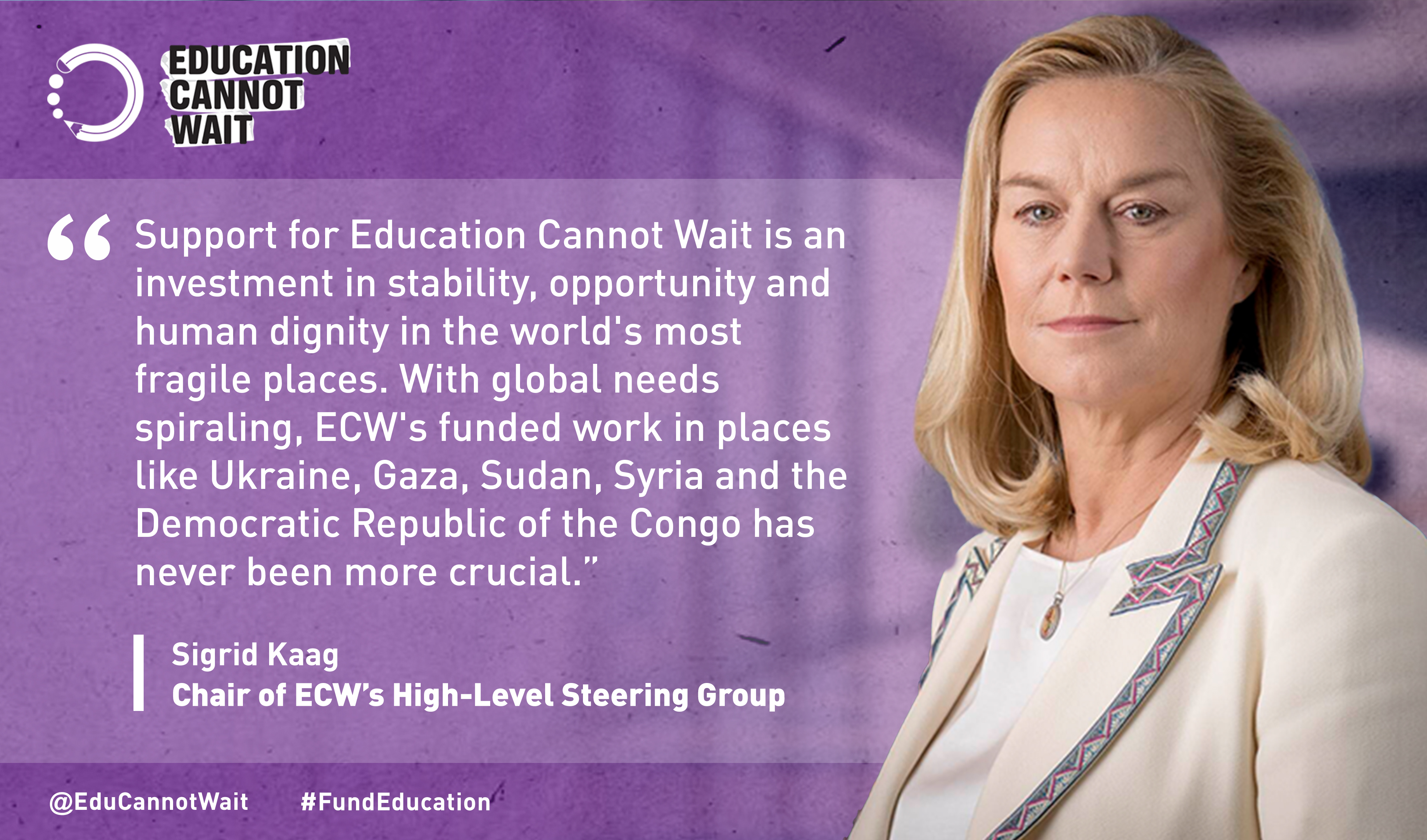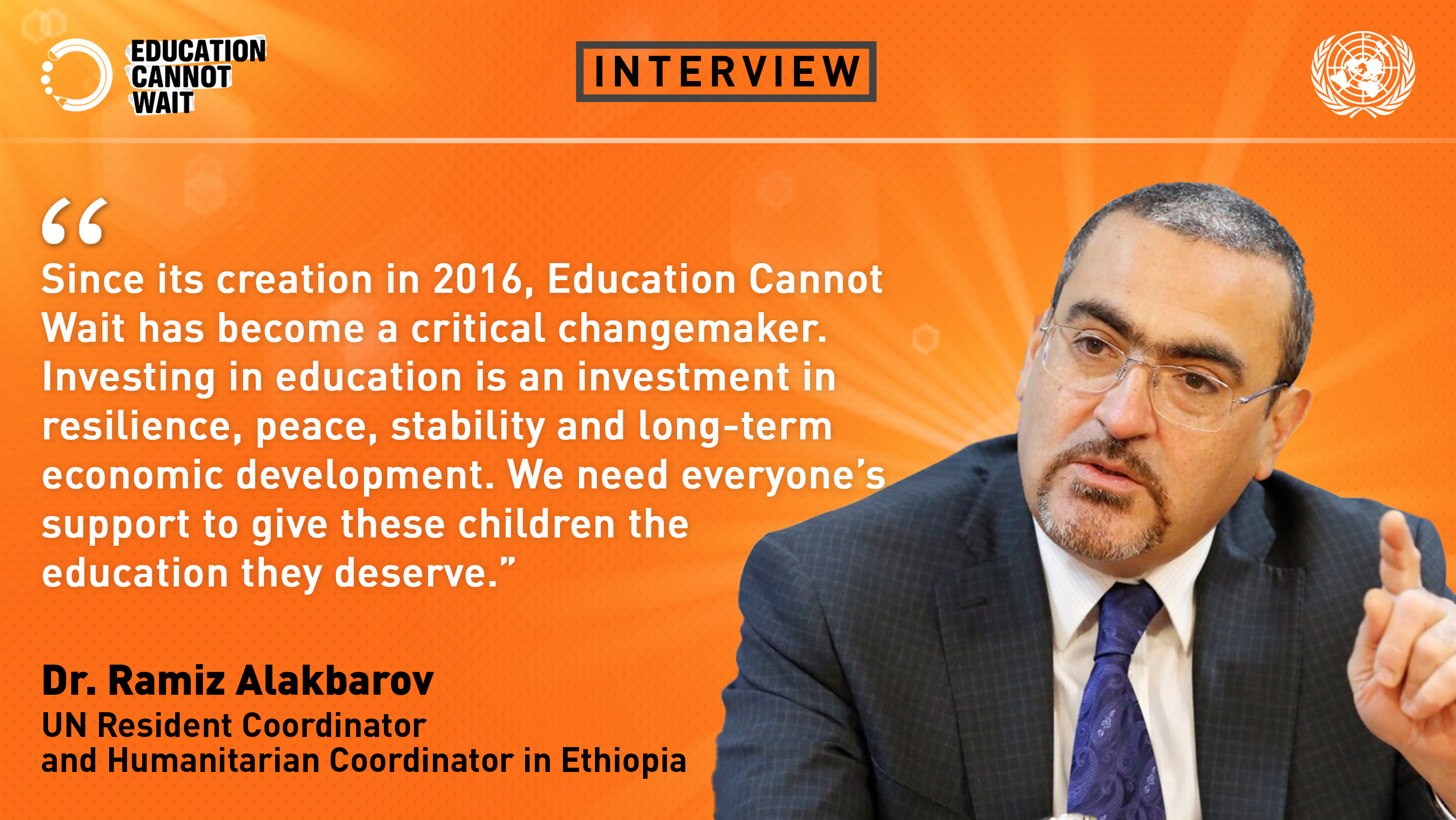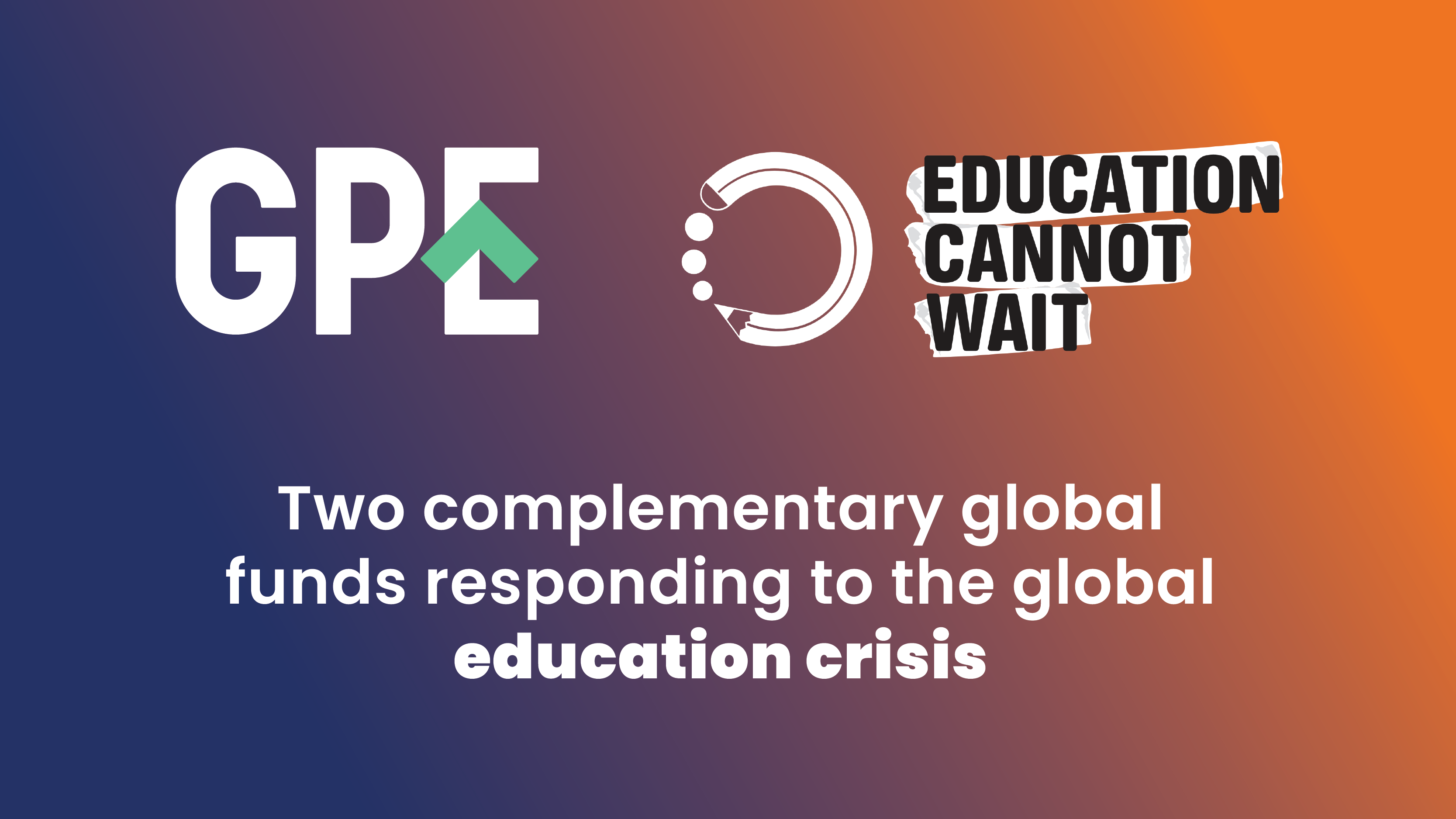Education Cannot Wait Interviews German Minister for Economic Cooperation and Development Svenja Schulze

‘Quality Education – SDG 4 – is a key enabler for the achievement of all the Sustainable Development Goals, because learners are change-makers for sustainable development. Education is key for transformative change.’ ~ German Minister for Economic Cooperation & Development Svenja Schulze
ECW: Germany recently announced €200 million (US$228.3 million), in new, additional funding for Education Cannot Wait (ECW). What inspired Germany to make such a game-changing investment in ECW by prioritizing multi-year funding for education in emergencies?
Minister Svenja Schulze: First of all, I want to thank Yasmine Sherif for an inspiring meeting at ECW’s office in Geneva on the International Day of Education in January. I was impressed by her commitment and that of her team, she is truly a great advocate for education.
Our new government assumed office only recently, but we have ambitious plans to address today’s challenges. I want to make 2022 the year of real change in development politics, and further increase Germany’s efforts to help achieve the Sustainable Development Goals by 2030. What we need is new optimism, respect and international solidarity. We need to revive multilateralism and foster new forms of cooperation with which to address the challenges of our time. Access to quality education for everyone is more than just one of our goals for 2030, it is key for achieving so many of them – from fighting hunger and poverty to combating climate change and creating more peaceful and inclusive societies.
There are 128 million children and young people out of school in countries affected by crises and conflicts. Education is a human right and can offer stability and protection in times of crisis. And we have a shared responsibility to give the most vulnerable children a chance for a better future and a dignified life – we need to empower them to develop their full potential. Yet education is often one of the first services to be suspended in times of crisis, and among the last to be resumed. Most of the time, funding only comes at the peak of a crisis, for short-term emergency support, but sustainable financing is also crucial so that the predictability and effectiveness of education responses in emergencies can be increased. Germany has sent a strong message on the International Day of Education with its announcement regarding multi-year funding for ECW, signaling that we need reliable and sustainable commitments, and we hope other partners will join us.
ECW: Germany is now ECW’s number one donor – congratulations! What is your message to other public donors, as well as the private sector, who are considering support for ECW? How do multi-year financial commitments increase predictability and effectiveness of education responses in protracted crisis settings and help bridge the humanitarian-development nexus?
Minister Svenja Schulze: Thank you. I really want to point to ECW’s innovative approach towards education in emergencies. By bringing together public and private actors in humanitarian aid and development cooperation, ECW creates a bridge between short-term humanitarian action and longer-term development. Not only multilateral organizations such as ECW, but also recipient countries need committed and reliable funding so they are able to better plan and enhance the effectiveness of their programs. It’s like learning: it starts at birth and continues throughout life. This is how we need to think about education funding as well. It needs to continue, and we cannot afford disruptions.
In recent years, only about 2-4% of international aid has been spent on education, which is insufficient to ensure all children have the chance to receive a quality education. I want to encourage other economically strong countries, such as our G7 partners, as well as private donors to follow our example and invest in global education. Investing in education, especially for girls and children in conflict regions, is an investment in our future. In order to achieve SDG4 by 2030, we all need to step up our efforts. Only by joining forces will we be able to achieve our common goals by 2030.
And we need to coordinate better amongst ourselves: Germany has contributed intensively to the UNESCO-led process to build a Global Cooperation Mechanism for Education (GCM) and will continue to support efficient coordination of education in the future.
ECW: How can Germany’s G7 Presidency help inspire the political leadership needed to get all children caught in emergencies and protracted crises a quality education? Why should other G7 countries follow Germany’s example to prioritize and step-up funding for education for children and adolescents impacted by multiplying risks of armed conflicts, forced displacement, climate change & COVID-19?
Minister Svenja Schulze: One of our top German G7 priorities is gender equality. Our new government is committed to a feminist foreign and development policy. The devastating effects of the COVID-19 pandemic have undone many hard-won achievements in the field of gender equality. In Uganda, schools were closed for almost two years. Many girls will not return, and the risk of teenage pregnancies and early marriages has increased. UNICEF estimates that up to 10 million additional child marriages could be concluded before the end of the decade as a consequence of the COVID-19 pandemic.
To address the importance of girls’ education and bring girls affected by crisis back to school, in May 2021, Germany launched the “Support Her Education” (SHE) Initiative jointly with the Global Partnership for Education (GPE) and Nobel Peace Prize winner Malala Yousafzai, and we will further strengthen our commitment to girls’ education. Gender equality in education is a cornerstone of our feminist development policy. We specifically want to use our G7 Presidency to make a call for action to strengthen our joint efforts for the education of girls and young women.
ECW: Germany has prioritized climate action for its G7 Presidency. As the former Federal Minister for the Environment, Nature Conservation & Nuclear Safety, how can climate action and education work together to reach the targets outlined in the Paris Agreement and Sustainable Development Goals?
Minister Svenja Schulze: Quality Education – SDG 4 – is a key enabler for the achievement of all the Sustainable Development Goals, because learners are change-makers for sustainable development. Education is key for transformative change. If we invest in education, people will make use of their extraordinary capacities for innovation and find the solutions for our planet. We need young advocates for a sustainable future. The global health crisis, human-induced climate change, loss of biodiversity, rising temperatures and sea levels, poverty and unsustainable economic structures are just a few of the challenges that the world is facing today. 2020 was the hottest year on record, with hurricanes, wildfires, heat waves, droughts and floods worldwide, disproportionately affecting the poorest and most vulnerable people. We use more resources than the planet can generate in a year and if we don’t change our ways of production and consumption, by 2050 we will need three planets in order to survive. All this calls for transformative change, in policies, in behaviors, in the way we live our lives and in the way we interact with others.
As former German Federal Minister for the Environment, I have already advocated for global solutions to reach the targets of the Paris Agreement, for instance at the COP26 summit last year. As German Federal Minister for Economic Cooperation and Development, I will continue to focus attention on the global climate crisis and will use development cooperation for effective climate action worldwide.
ECW: The UN Secretary General is convening a global summit on Transforming Education in September 2022. How can we transform together the way we deliver education for the world’s most vulnerable children and adolescents?
Minister Svenja Schulze: Transforming education means that we need to put the “Leave No One Behind” principle into practice. For the past two years, the COVID-19 pandemic has disrupted learning around the world. Global school closures have exacerbated education inequalities worldwide, putting those already marginalized even further behind. If we simply carry on from where we stopped, learners will not be able to catch up. In order to narrow the educational gap, we urgently need a reset in education and a transformation in the way we deliver education for the world’s most vulnerable children and adolescents.
First, we need learner-centered approaches to education. This means that we must assess learning losses over the course of the pandemic so that we can pick learners up right where we lost them and respond adequately to their needs and abilities. Let us evaluate curricula, teacher training and schools so as to respond adequately to the diversity of learners’ needs and abilities.
Second, children need a healthy and safe social environment in order to learn. We need to link education to other aspects of life such as health, nutrition and security. Only healthy and well-nourished children can learn and succeed in school. In crisis contexts, parents will only allow their children to attend schools if they are safe. Often, schools are the only places where children have access to sanitation and meals.
Third, we must focus our attention on teachers. They are at the center of high-quality, inclusive education and they have the greatest impact on students’ learning. Progress in education very much depends on the training of the teaching staff. On the other hand, teachers can positively influence transformative change. They serve as role models, which is particularly important when we talk about gender equality. And we need qualified teachers to teach future skills such as digital literacy, critical thinking and problem-solving skills.
And finally, we must rethink the tools we use to deliver education. Embedding digital technologies in curricula, teaching and learning processes can improve access to education and its quality. However, we need to make sure these approaches are tailored to the local contexts and people’s needs. In 2020, more than a third of the world’s population had never accessed the internet. Also, there is still a digital gender divide that we need to address, especially in Africa. Plus, both teachers and students often lack basic digital skills, whilst internet access and IT equipment are not readily available or affordable for everyone. We need to take these and many other factors into account, so that the full potential of digital approaches for high-quality and inclusive education can be unleashed.
ECW: Education is a fundamental human right and a great equalizer. Why should we invest in education for girls caught in the world’s worst humanitarian crises? Why is investing in universal, equitable education in the best interest of Germany, the European Union and the rest of the world?
Minister Svenja Schulze: Education is more than just a human right, it is key to self-empowerment and the cornerstone of sustainable development. Education can transform the lives of individuals and families, or whole societies – and our world. It is key to breaking the cycle of poverty, to better health, a cleaner environment, and to more tolerance.
Yet, access to and the quality of education vary greatly across – and even within – countries, leaving children from poorer households and those caught up in emergencies and protracted crises especially disadvantaged.
Girls in such contexts are particularly at risk of not being able to exercise their right to education. For instance, in Afghanistan, we have to ensure that schools remain places of peace and hope, and we need to make sure that girls are able to attend school. Let’s not risk all the progress that was made in 20 years of development cooperation. Twelve times more children than before were going to school, and girls especially were getting a chance to empower themselves through education
What is more, girls are more vulnerable to being obliged to drop out of school early, not only in crisis-affected regions. As a direct result of the COVID-19 pandemic and the increase in poverty, 20 million more secondary-school-aged girls may never return to school. Moreover, there is the risk that one in two refugee girls in secondary school may drop out. Many of them will be forced into child marriages or will have to work to help provide for their families.
Educating girls has the power to unleash unseen potential. As The Rt. Hon. Gordon Brown, UN Special Envoy for Global Education, pointed out in last month’s ECW interview, every dollar we invest in girls’ education promises a financial return of US$2.80 in our partner countries. And the investment does not just pay off financially: studies show that girls’ and women’s involvement in negotiations and decision-making positively influences climate protection and leads to more sustainable peace.
ECW: Do you have a book recommendation for our readers that influenced you personally and professionally?
Minister Svenja Schulze: At the Munich Security Conference in February I had an inspiring talk with Kristina Lunz, Co-founder and co-Executive Director of the Centre for Feminist Foreign Policy. She just published her book “Die Zukunft der Außenpolitik ist feministisch” (The future of foreign policy is feminist). And that also goes for development policy. I hope her book will soon be published in English as well because, in my view, it is a book all leaders should read. Lunz shows how we can achieve a safer and more just world. She explains how important it is that societies worldwide ensure equal rights for women and girls, better representation of women at all levels and in decision-making processes, and more resources to support gender equality, which will benefit society as a whole – this goes from education for girls, and supporting women entrepreneurs to involving women in peace-making processes. Supporting women and girls will help immensely with achieving all of the Sustainable Development Goals – from fighting hunger to more peaceful societies.
About Svenja Schulze
Svenja Schulze was born on 29 September 1968 in Düsseldorf. From 2018 to 2021, she was the Federal Minister for the Environment, Nature Conservation and Nuclear Safety. Prior to that, from 2010 to 2017, she headed the Ministry for Innovation, Science and Research of the Federal State of North Rhine-Westphalia. From 1997 to 2000, and from 2004 to 2018, the new Minister, who holds a degree in German and Political Sciences, was a member of the state parliament of North Rhine-Westphalia. Between her stints in the state parliament she worked as a business consultant with a focus on the public sector.



